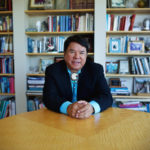A young Chicano man working in a stockroom feels ostracized for not speaking SpanishBy David Madrid, New America Media SAN JOSE, Calif. – Oct 4, 2005 – I just landed a job at a Target store here on the east side of San Jose. On the morning crew, all of us working in the stockroom are Latino, and three-fourths speak Spanish only. I’m one of only two workers who speak only English. Not speaking Spanish has been a problem from day one. At the various jobs I’ve worked, I have often seen workers discriminated against because of language, but usually it is because they don’t speak English. Here, I feel discriminated against by my peers because I don’t speak Spanish. I’ve always been aware of the social segregation between Chicanos and Mexican immigrants, at school and on the street. At this job, I feel unwelcome, and even face animosity, because I am Chicano and can’t speak Spanish. My personal situation is soon to be a California situation. Four out of 10 children in California now have at least one parent born in another country — the highest percentage in the nation. And the jobs immigrants are getting are the ones Chicanos are already in — mega-stores like Target and Wal-Mart. On my first day, a couple of co-workers attempted to have conversations with me in Spanish as we went about our work. To their surprise, they found I did not speak the language. That would be the first and last time I would have any contact with them. Now, they won’t even look my way as I pass them in the aisles. At times I feel uncomfortable and have a strange feeling of not belonging when I don’t understand the conversation and laughter around me during work, or am ignored at lunch and breaks. I even have trouble understanding some of the morning supervisors, who use Spanish when they give instructions to our department over the loudspeaker. Other times they will walk up and give me directions in Spanish, then catch themselves and switch to broken English. Growing up, I often encountered similar problem. If I did know Spanish, the first thing I would do would be to cut through the tension by breaking down the misconception that underlies it — that if you are Mexican and don’t speak Spanish, you are ashamed of your culture. Many Latinos consider Chicanos who don’t speak Spanish “gringos,” or “white-washed.” That is far from the truth. I know many Chicanos who feel ashamed of not being able to speak the language and are making efforts to learn — not to mention studying and embracing the culture and history of our people. So why don’t I speak Spanish? The answer is the same one many other monolingual Chicanos will give: My parents didn’t teach me. My parents don’t speak Spanish because my grandparents didn’t want them to — not out of shame but out of fear. My grandma told me that when she was a little girl growing up in California’s Central Valley, she would get punished by teachers for speaking Spanish at school. You better believe there were no ESL classes for our grandparents and parents growing up in the United States. A lot of our families have endured generations of racism here in the United States, and language differences made it that much easier to fall victim to prejudice. Throughout California and the Southwest in the 1930s and ’40s it was common to see signs in front of restaurants and stores that read “No Dogs or Mexicans Allowed.” My grandpa told me that back in those days, you could get kicked out of some places for speaking Spanish in public. It’s not like this treatment is all ancient history. A couple of months ago, a Los Angeles bus driver kicked all the Latino passengers off her bus because some were speaking Spanish. She thought they were saying offensive things about her. For a lot of us Chicanos, not speaking Spanish is not a result of being ashamed of our culture. It’s the legacy of generations of American racism, dating back to our grandparents and before. I wish the two co-workers who approached me on my first day of work, and all the other Spanish-speaking Latinos who look down upon me for being English-only, knew all the feelings and history that lie behind my simple response to their attempts at conversation — “No habla Español.”
PNS contributor David Madrid, 27, is a writer and youth organizer for Silicon Valley De-Bug, the voice of young workers, writers and artists in Silicon Valley and a PNS project. |
||
|










